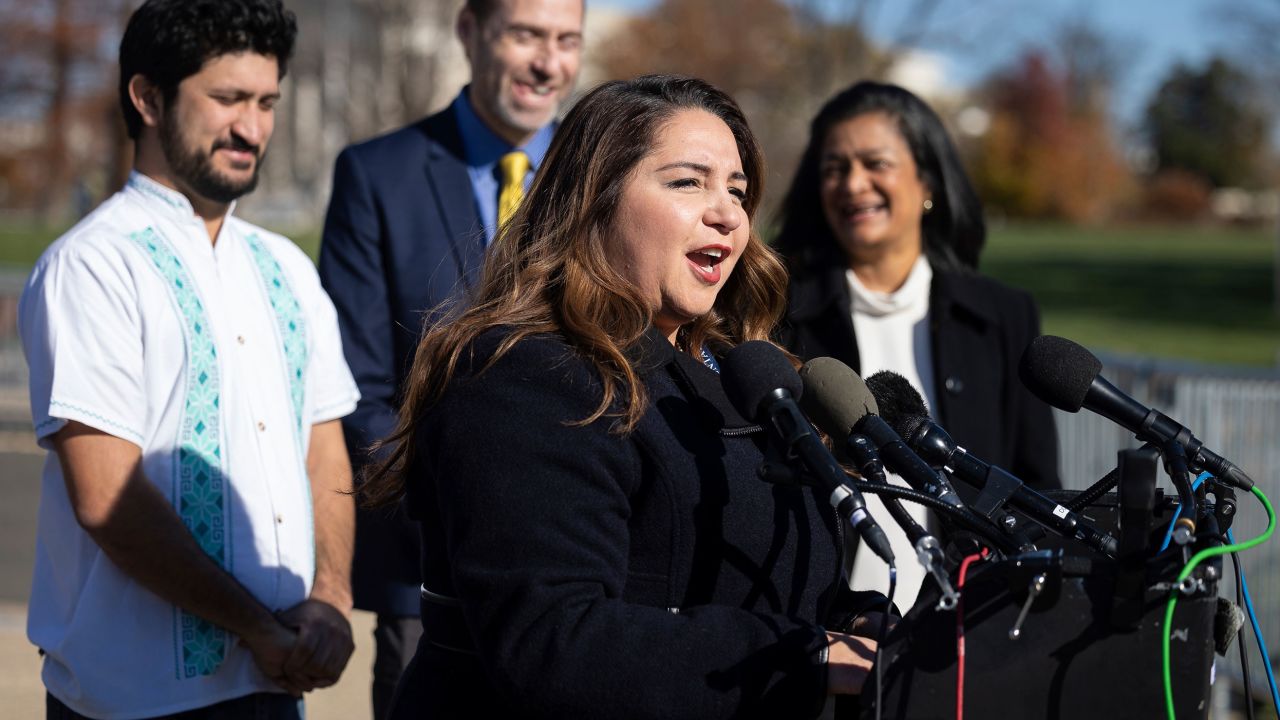A pregnant mom crossed the Rio Grande decades ago to give her unborn child a better life. Now her daughter is becoming a member of Congress
Representative-elect Delia Ramirez speaks at a news conference outside the US Capitol on December 2, 2022.

Delia Ramirez walks toward the microphone determined to make her message heard.
“It is time – it is past time that we deliver on the promise that we have made to our Dreamers,” she says.
On a crisp morning in early December, Ramirez is standing steps away from the US Capitol, with its white dome gleaming against the blue sky behind her. This is a rallying cry we’ve heard here time and again – but Ramirez hopes when she says it, the words will carry even more weight. This isn’t merely a talking point from her campaign platform.
“This,” the Illinois lawmaker says, “is very personal for me.”
It’s personal because if Congress doesn’t act, Ramirez’s husband could be among hundreds of thousands of people facing possible deportation. And it’s personal because Ramirez herself is about to become a member of Congress.
She’s called this news conference, flanked by several of her fellow incoming freshmen lawmakers and Congressional Progressive Caucus Chair Pramila Jayapal, a Washington state Democrat, to push for members of Congress to pass several key pieces of legislation while Democrats still control the US House. Among them: the DREAM Act, which would give a possible pathway to citizenship to some 2 million undocumented immigrants who were brought to the United States as children.
That’s far easier said than done, as decades of debate over immigration reform on Capitol Hill clearly show.
But Ramirez says no matter how many obstacles pop up in her path, she’ll keep pushing.
As constant and controversial as conversations around immigration in Washington have become, many lawmakers weighing in don’t have direct personal connections to the issues they’re debating.
Ramirez, 39, has lived them her entire life.
Her mom was pregnant with her when she crossed the Rio Grande – a detail Ramirez made a point to include in a candidate bio on her campaign website, which notes that her mom went on to work “multiple low-wage jobs to give her children a fighting chance to escape poverty.”
Ramirez says over the years some of her political opponents have tried to use details like this from her background against her, accusing her of being in favor of open borders and speaking dismissively about her family during debates. But Ramirez sees her family’s story as a strength that’s helped her connect with voters and better understand the issues that matter to her constituents.
“I didn’t have to shy away from the fact that I’m working class and my husband’s a DACA recipient, that I’m worried about how I’m going to pay for housing. That is the reality of so many people,” she says. “And I want men and women, young and old, to see me and think, ‘That was my m’hija, That was my daughter.’ Or…’I’m an intern somewhere and I don’t feel seen. But if she could do it, so can I.’”
Ramirez says the story of her mom’s journey from Guatemala to the United States infused her childhood in Chicago, where Ramirez was born.
According to the story Ramirez grew up hearing, when her mom crossed the Rio Grande, strong currents nearly swept her away. She’d hidden her pregnancy from others on the journey, but in that moment she called out in desperation, “Help! Help! Save me! Save my daughter!” A man did, Ramirez says, but after that day, her mom never saw him again.
As she struggled with depression as a teenager, Ramirez says her mom would frequently invoke this part of her past, saying, “I nearly died so that you could be born. Now I have to fight to keep you alive.”
That struggling teen, Ramirez says, would never have imagined that she’d run a homeless shelter and other successful nonprofits, go on to become a state lawmaker and one day be on the cusp of entering US Congress.
“But that is the journey, right?” Ramirez says. “Maybe not the Congress part as often as it should be, but the journey of so many people and so many children of immigrants who contribute and do so much for this country.”
How does her family’s journey shape her view of what’s unfolding now at the border?
“I am clear that anyone willing to risk dying, starving or even being raped in the long journey through desert, cold and tunnels is crossing because they feel like there is no other solution to their situation. Their migration is the only way they see themselves and loved ones surviving deep poverty and, in some cases, persecution,” Ramirez says.
“My mother wouldn’t have risked my life or hers had it not been the only option she saw for her unborn child to have a chance at a life and childhood better than hers.”
As Ramirez shares these and other details from her past with CNN in the Longworth House Office Building one evening in early December, an aide steps in with her phone in hand.
“It’s time,” he tells her.
Ramirez is still an Illinois state legislator for a few more weeks, and she needs to vote on a measure that might not pass if she doesn’t.
She holds the phone in one hand and looks into the camera.
“Representative Ramirez votes yes,” she says, then hands the phone back to her aide.
“Done,” she says with a triumphant smile.
It’s the latest in numerous bills Ramirez has helped pass since her 2018 election to the Illinois General Assembly.
In that way alone, she knows it will be an adjustment to work as a lawmaker in Washington, where partisan fights often get in the way of passing laws.
She still remembers the first state bill she sponsored that passed in March 2019 – a measure to expand homelessness prevention programming, a top concern for Ramirez, who previously directed a homeless shelter.
“It was a very emotional moment,” she says. And the first thing she did after the bill passed, she says, was call her mom and share the news.
“I said, ‘Mom, in three months I was able to do more (to prevent homelessness) than I had done in almost 15 years,’” Ramirez recalls.
Her mom responded that she was proud but reminded Ramirez that her work wasn’t finished.
“Go hang up, and do more,” she said, according to Ramirez. “And don’t forget where you come from.”
It’s with that mantra in mind, and with memories of growing up as the daughter of immigrants who worked multiple jobs to support their family in Chicago, that Ramirez is heading to Washington.
Both her parents are US citizens now, but Ramirez says they’re still struggling to make ends meet.
“I am the daughter of a woman who at 61 has given so much to this country and is a minimum-wage worker that can’t afford health care, so she’s on Medicaid, and diabetic,” Ramirez says. “I am the daughter of a man who spent 30 years working in an industrial bakery, a union busting company, and the day he retired, he got a frozen pie. He didn’t get a retirement pension and he struggled with Medicare supplemental, covering the cost.”
Ramirez married Boris Hernandez in October 2020. They met earlier that year in what she describes as “one of those pandemic loves.”







